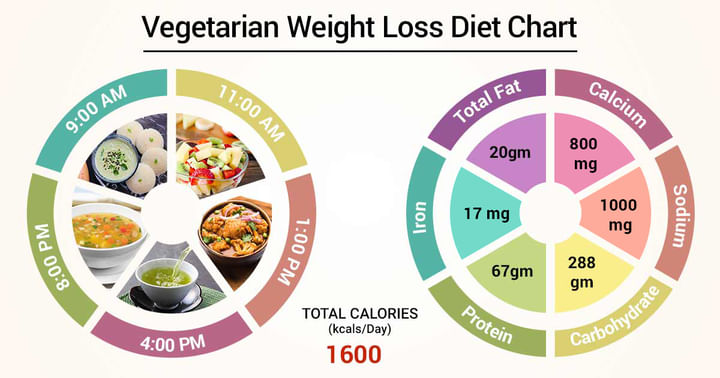Diet Chart For vegetarian weight
Last Updated: Jan 20, 2025
About
Vegetarian diets provide necessary nutrients for proper functioning of the body. The diet can also help in weight loss. Vegetarian diets have now become popular for many health benefits, besides weight loss being the major one. The vegetarian weight loss diet includes various plans like lacto-ovo which consists mainly of milk products; where “lacto” means milk and “ovo” means eggs, lacto-vegetarian that includes milk products but not eggs, meat, seafood etc. and vegan plans that are totally vegetarian and include of plant foods only. Research studies have demonstrated health benefits of vegetarian and vegan plans, which have been highly beneficial for weight loss, reduced risk of diabetes, heart diseases and cancer to an extent. This is because they have a high content of fibre, folic acid, vitamins C & E, potassium and magnesium etc. Vegetarian weight loss diet shows best results as they are typically lower in fat, particularly saturated fat and higher in dietary fibre. Vegetarian diet plans also comprise of ingredients like whole grains, legumes, nuts, soy protein etc. Although, a well-planned Vegan diet plan can as well meet all the nutritional requirements of the body. Contrasted with vegetarian and Vegan diets, vegetarian weight control plans have a tendency to contain less soaked fat and cholesterol and more dietary fibre. Vegans have a tendency to be more slender, have brought down serum cholesterol, lessening their danger of coronary illness.
Diet Chart
| Sunday | |
| Breakfast (8:00-8:30AM) | 3 Idli + Sambar 1/2 cup/ 1 table spoon Green chutney/ Tomato Chutney |
| Mid-Meal (11:00-11:30AM) | Fruit Salad (1 cup) + Tender Coconut Water (1 glass) |
| Lunch (2:00-2:30PM) | Cabbage Curry (1 cup) + Dal (1 cup) with 1/4th Fresh Lime |
| Evening (4:00-4:30PM) | Green Tea (1 cup) with 1/2 tsp Honey + 5 Almonds + 4 Chashews + 3 Raisins |
| Dinner (8:00-8:30PM) | Sauteed Veg soup (1 cup) + Salad (1 serve) |
| Monday | |
| Breakfast (8:00-8:30AM) | Chapati (2) + Daal (1 cup) |
| Mid-Meal (11:00-11:30AM) | Lassi (1 glass) |
| Lunch (2:00-2:30PM) | Cauliflower Curry (1 cup) + Dal (1 cup) with 1/4th Fresh Lime |
| Evening (4:00-4:30PM) | Green Tea (1 cup) with 1/2 tsp Honey + 5 Almonds + 4 Chashews + 3 Raisins |
| Dinner (8:00-8:30PM) | Sauteed Soy Bean Salad (1 cup) |
| Tuesday | |
| Breakfast (8:00-8:30AM) | Mix veg Poha 1 cup+ 1 cup low fat milk. |
| Mid-Meal (11:00-11:30AM) | Fruit Salad (1 cup) + Tender Coconut Water (1 glass) |
| Lunch (2:00-2:30PM) | Rajma (1 cup) |
| Evening (4:00-4:30PM) | Green Tea (1 cup) with 1/2 tsp Honey + 5 Almonds + 4 Chashews + 3 Raisins |
| Dinner (8:00-8:30PM) | Veg Salad (1 cup) |
| Wednesday | |
| Breakfast (8:00-8:30AM) | Methi Paratha 2+ 1 tbs green chutney. |
| Mid-Meal (11:00-11:30AM) | Chaach (1 glass) |
| Lunch (2:00-2:30PM) | Cabbage Curry (1 cup) + Dal (1 cup) with 1/4th Fresh Lime |
| Evening (4:00-4:30PM) | Green Tea (1 cup) with 1/2 tsp Honey + 5 Almonds + 4 Chashews + 3 Raisins |
| Dinner (8:00-8:30PM) | Sauteed Veg soup (1 cup) + Salad (1 serve) |
| Thursday | |
| Breakfast (8:00-8:30AM) | Chapati (2) + Daal (1 cup) |
| Mid-Meal (11:00-11:30AM) | Fruit Salad (1 cup) + Tender Coconut Water (1 glass) |
| Lunch (2:00-2:30PM) | Cauliflower Curry (1 cup) + Dal (1 cup) with 1/4th Fresh Lime |
| Evening (4:00-4:30PM) | Green Tea (1 cup) with 1/2 tsp Honey + 5 Almonds + 4 Chashews + 3 Raisins |
| Dinner (8:00-8:30PM) | Sauteed Soy Bean Salad (1 cup) |
| Friday | |
| Breakfast (8:00-8:30AM) | Mix veg Poha 1 cup+ 1 cup low fat milk. |
| Mid-Meal (11:00-11:30AM) | Lassi (1 glass) |
| Lunch (2:00-2:30PM) | Rajma (1 cup) |
| Evening (4:00-4:30PM) | Green Tea (1 cup) with 1/2 tsp Honey + 5 Almonds + 4 Chashews + 3 Raisins |
| Dinner (8:00-8:30PM) | Veg Salad (1 cup) |
| Saturday | |
| Breakfast (8:00-8:30AM) | Methi Paratha 2+ 1 tbs green chutney. |
| Mid-Meal (11:00-11:30AM) | Fruit Salad (1 cup) + Tender Coconut Water (1 glass) |
| Lunch (2:00-2:30PM) | Sauteed Paneer with Veggies (1 cup) with Cucumber and 1/4th Fresh Lime |
| Evening (4:00-4:30PM) | Green Tea (1 cup) with 1/2 tsp Honey + 5 Almonds + 4 Chashews + 3 Raisins |
| Dinner (8:00-8:30PM) | Chickpeas n mushroom Salad (1 cup) |
Food Items To Limit
- Eggs : In addition to excluding meat, lacto-vegetarians do not eat eggs. However, lacto-vegetarians do consume at least some milk and dairy products.
- Foods Containing Gelatin : Gelatin is often an ingredient in marshmallows, yogurt, margarine, jello, gummy candy and cottage cheese, as well as in other dairy products, including sour cream and ice cream.
- Other tricky ingredients : Stearic acid, found in some gums, candy and flavorings may come from either animal or vegetable sources. Monoglycerides and diglycerides are additives that can be either animal- or plant-derived. Enzymes used in cheese making are often animal-based. A common coagulating agent in cheese is rennet, made from the stomach lining of calves.
Do's And Dont's
Do's:
- Eat foods rich in, or fortified with, calcium
- Pair iron-rich foods with vitamin C
- Be mindful of protein: About 20% of your total calories should come from protein.
Don'ts:
- Eat mostly processed sources of protein
- Think going veg is automatically making your diet healthier
- Get stuck in a diet rut
Food Items You Can Easily Consume
- Tofu : Plain tofu has a lot going for it. It's a terrific source of protein, zinc, iron, and it even contains some cholesterol-lowering omega-3 fatty acids. It also gives you more than 100 milligrams (mg) of calcium in a half cup.
- Lentils : Lentils, like beans, are part of the legume family, and like beans, they're an excellent source of protein and soluble fiber. But lentils have an edge over most beans: They contain about twice as much iron.
- Beans : A cup a day gives you about one-third of your iron and protein and roughly half your fiber. Even better, most of that is soluble fiber, which helps lower cholesterol.
- Nuts : They're a nifty source of quick, totally palatable protein. In additon, walnuts, peanuts, almonds, cashews, pecans, macadamias and Brazil nuts are rich in zinc, vitamin E and omega-3 fatty acids.
- Grains : Some enriched whole-grain cereals are fortified with hard-to-get vitamin B12—some even offer 100 percent of a day's requirement in one serving—as well as iron, calcium and many other nutrients.
- Leafy Greens : Unlike most vegetables, dark leafy greens such as spinach, broccoli, kale, Swiss chard and collards contain healthful amounts of iron—especially spinach, which has about 6 grams or about one-third of a day's supply.
- Seaweeds : Besides being a terrific source of iron and phytochemicals, many seaweeds—such as alaria, dulse, kelp, nori, spirulina and agar—are good sources of minerals, including magnesium, calcium, iodine, iron and chromium, as well as vitamins A, C, E and many of the Bs. Talk about superfoods.
- Dried Fruits : They're good, super-convenient sources of iron—and if you combine them with some mixed nuts, you've got a packet of iron and protein you can take anywhere easily. In addition, dried fruits—think apricots, raisins, prunes, mangos, pineapple, figs, dates, cherries and cranberries—provide a wide array of minerals and vitamins as well as some fiber.
References
- Smith CF, Burke LE, Wing RR. Vegetarian and weight‐loss diets among young adults. Obesity research. 2000 Mar;8(2):123-9. [Cited 30 June 2019]. Available from:
- Berkow SE, Barnard N. Vegetarian diets and weight status. Nutrition Reviews. 2006 Apr 1;64(4):175-88. [Cited 30 June 2019]. Available from:
- Tonstad S, Butler T, Yan R, Fraser GE. Type of vegetarian diet, body weight, and prevalence of type 2 diabetes. Diabetes care. 2009 May 1;32(5):791-6. [Cited 30 June 2019]. Available from:
Table of content
Find Dietitian/Nutritionist near me
Ask a free question
Get FREE multiple opinions from Doctors



